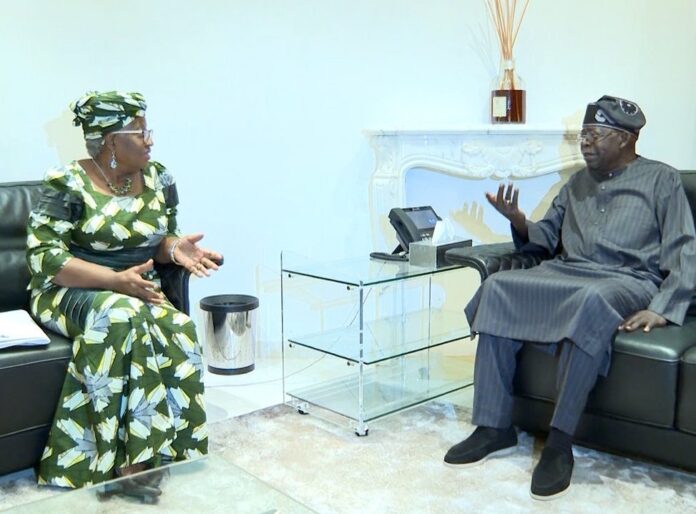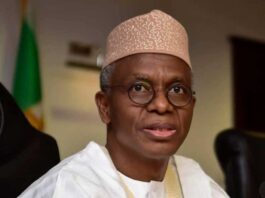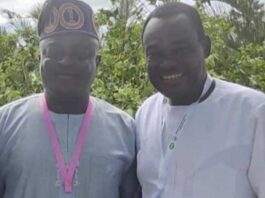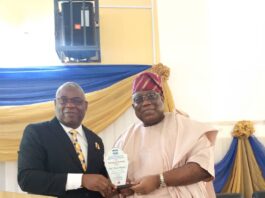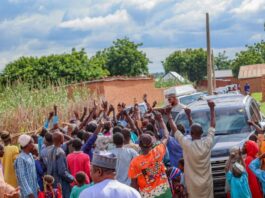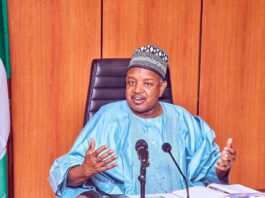•Says reforms in right direction
•Urges FG to implement social safety nets to cushion effects of reforms on the poor
•At launch of $50m women exporters in digital economy fund, WTO DG rallies Nigeria to partake in $4.25trn global digital trade
CHIGOZIE AMADI
The Director-General of the World Trade Organisation (WTO), Dr. Ngozi Okonjo-Iweala, yesterday hailed President Bola Tinubu efforts towards stabilising the Nigerian economy.
Okonjo-Iweala, a former two-time Nigerian Minister of Finance and Coordinating Minister of Economy, gave the commendation during an interview with journalists, after a closed-door meeting with Tinubu.
Also yesterday, at a separate event that saw the launch of a $50 million Women Exporters in the Digital Economy Fund (WEIDE Fund) in Abuja, the WTO Director General tasked the West African country and Africa by extension, to tap into the $4.25 trillion global digital trade to enhance its fortunes.
During the interview with journalists after her meeting with Tinubu, Okonjo-Iweala emphasised that all hands must now be on deck to further grow the economy.
She also advised that government should create social safety nets to cushion the effects of the economic reforms on the citizenry.
She said: “We think that the President and his team, and we just exchanged that with him, have worked hard to stabilise the economy, and you cannot really improve an economy unless it’s stable.
“So he has to be given the credit for the stability of the economy. So the reforms have been in the right direction.
“What is needed next is growth. We now need to grow the economy, and we need to put in social safety nets so that people who are feeling the pinch of the reforms can also have some support to be able to weather the hardship. So that’s the next step.
“How do we build social safety net to help Nigerians cushion the hardship they are feeling, and then, how do we grow the economy so we can create more jobs and put more money in people’s pockets? These are issues that we discussed with Mr. President.”
Asked the purpose of her visit to the President, Okonjo-Iweala said: “We came to brief him about something very joyful that we did today, with the help of the First Lady we launched a women exporters fund for the digital economy.
“This is a fund that is jointly managed by the WTO and the International Trade Center (ITC) in Geneva, and the idea is to help support the economy and support women, to be able to weather the storms of the economy and be able to create jobs for themselves for others, is part of thinking of what is a social safety net?
“How can we help support Nigerian women to contribute more to the economy and to themselves?”
The WTO DG stated that she had earlier in the day participated in the launch of a Women Exporters Fund for the digital economy, facilitated by the wife of the President, Senator Oluremi Tinubu.
Nigeria, she said, was one of four countries selected globally for the scheme, with the effort coordinated locally by the Ministry of Trade and Investment and the Nigerian Export Promotion Council. Out of 67,000 Nigerian women who applied, 146 were selected to benefit from the fund.
According to Okonjo-Iweala, 16 beneficiaries won the “booster track” category for established businesses and will receive 18 months of technical and business support, while another 100 will get direct grants of $5,000 each and 12 months of business support to start or scale their enterprises.
“This is just the beginning,” she said, noting that the goal was to enable more Nigerian women to weather economic challenges, create jobs, and contribute more to national growth.
Meanwhile, during the launch of the fund earlier, Okonjo-Iweala, tasked the country and Africa by extension, to tap into the $4.25 trillion global digital trade to enhance its fortunes.
She said total global trade was currently at $30.4 trillion about 27 per cent of global GDP of $114 trillion.
But, she said Africa’s share of the “most important part of digital trade is minuscule at about one percent”.
The former Minister of Finance and Coordinating Minister for the Economy said digital trade had become the fastest growing segment of global commerce.
According to her, digitally delivered services trade, which is a segment of digital trade involving outsourcing – business process services, consulting and IT services, legal, medical, educational and other services – constitute the fastest growing segment of trade.
She said, “Given our entrepreneurial talent, it is an aspect of digital trade that we hope many of our women can see as an opportunity to also grow their businesses in this area.”
However, she said, “When it comes to digitisation and the infrastructure needed, globally 67 per cent of the population, about 5.4 billion people are now online. “In Nigeria, the figure is much lower – about 45 per cent. That means that more than half of Nigerians are still not connected.”
She said there’s still a huge gap in internet penetration in the country, adding that internet access, especially in terms of accessibility, reliability, and affordability of power, remained worrisome.
She said, “No nation can truly digitise without a steady supply of electricity.
“We are still struggling with this in Nigeria and I hope there can be strong collaboration on solutions between the power and digital communication sectors on solutions so that Nigeria can seize the emerging opportunities in the digital arena.”
Nonetheless, the WTO boss said the launch of the fund came at a time when global trade is going through extremely challenging times of unilateralism and increased protectionism.
She said the goal of the fund was “simple, but ambitious: to give women the tools, the knowledge, the networks, and the resources they need to access global value chains, so their businesses are not just surviving, but thriving, on the world stage.”
Okonjo-Iweala also said the WEIDE Fund was rolling out in four countries—Jordan, Mongolia, the Dominican Republic, and Nigeria.
She said, “And Nigeria’s participation is special. Out of more than 600 business support organisations from around the developing world that competed to work with us, the Nigerian Export Promotion Council, led by the Executive Director Nonye Ayeni, stood out.”
She said, “In Nigeria, 67,000 women entrepreneurs applied to be part of WEIDE.
“The competition was fierce. Initially, we planned to support 100 women. But the quality of the applications was so high and the innovation was so inspiring, that we increased this to 146 awardees.
“Today, we are awarding the 146 Nigerian women entrepreneurs who have been selected and will be starting the process as the first cohort of the WEIDE fund.
“The monetary awards will be disbursed directly into the accounts of the women, based on certification by NEPC that they are delivering in the business the way they are supposed to.
She said 16 of the businesses selected have been “selected for what we call the Booster Track—they will each receive up to $30,000 in grant funding, plus an intensive 18-month technical assistance programme…”
Okonjo-Iweala said, “In this regard, we applaud the proposed ambitious $2 billion, 90,000 kilometre national fibre optic network aimed at expanding internet access especially in our secondary towns and rural areas.
“Yet, we know a great deal of the gap in internet access has to do with accessibility, reliability and affordability of power.
“No nation can truly digitise without a steady supply of electricity. We are still struggling with this in Nigeria and I hope there can be strong collaboration on solutions between the Power and Digital Communication Sectors on solutions so that Nigeria can seize the emerging opportunities in the digital arena.”
She added, “To help ensure our women continue to be a strong part of the digital era we also need the inter-ministerial support of the Ministry of Trade, Investment ant Industry as well as Minister of Women Affairs all working together.
“I referred just now to the opportunities that await Nigeria in the Technology and Digital arena. The potential is enormous.
“According to the World Economic Forum, the ICT Sector contributed 18 per cent to Nigeria’s GDP in 2022, a leap from less than one per cent in 2001.
“But despite the advances we celebrate today, we know that women have not played as big a role in the sector as they could.
“A joint study by the Washington DC based Center for Global Development and the One Campaign found that of almost 100 Nigerian tech companies surveyed, only 30 per cent were owned by women. Up to one third of these companies did not even have women working in them.”
Okonjo-Iweala said, “We also know that Nigeria’s ranking in the latest Global Gender Gap report by the WEF, released in June 2025, is not encouraging.
“Nigeria ranked 128th out of 148 countries, putting us in the bottom tier of countries with large gender gaps.
“Even though much of Nigeria’s poor performance is due to widening gaps in polictical empowerment, educational attainment and health and survival, pushing further on economic participation and empowerment where we are doing better can further enhance and lift Nigeria’s standing globally.
“That is why at the WTO and ITC we have worked hard with the support of our donors, the United Arab Emirates, the State of Qatar and the FIFA-Qatar World Cup Legacy Fund, to prioritise the empowerment of women in digital trade.
“The WEIDE Fund will provide us with an opportunity to help women entrepreneurs improve their economic, social and hopefully political standing thereby narrowing some of the gender gaps.”


